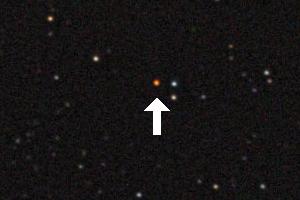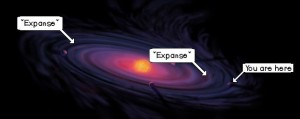Yes, God created all of this just so you could exist.
![]()
Everywhere we look, we see evidence that Genesis is not just a nice myth, but is a literal,
factual, and accurate account of how God created the Universe and everything in it.
— Dr. Jack Crenshaw, physicist and consultant to NASA for the Apollo program
![]()
Missing The Point
Human beings miss the forest for the trees, then nitpick and strain at gnats. We cap it all by riding the camel in the wrong direction, blindfolded, while singing happily (and off key), “I’m right and you’re not, so THEERRE!” As Shiplord Kirel said in Harry Turtledove’s Worldwar/Colonization series, “Big Uglies (that’s us) are the most indefatigable arguefiers the Race (that’s them) has ever known.”
Take the Christian doctrine of Predestination. Did God literally choose who would come to know Him, or did He merely know in advance who would decide to follow Jesus? For centuries, theologians have hurled rocks at each other about this. They’re so busy flingin’ and dodgin’, most have completely and utterly missed the point.
Regardless of whether God actually chose us or simply operated from foreknowledge, the important thing is that God knows His children, works all things for our good and has a plan for your life.
Likewise with the book of Genesis. Whether you take the creation account literally (as I do, with the exception of the 24-hour days) or see it as liturgical or even symbolic, don’t miss the point: man was created in God’s image.
You are not an accident. We are not just happy puddles marveling at how well we fit in our little holes. We are the special creations of an almighty God.
Pictured: puddle logic.
![]()
Miracles
The miracles in the Bible don’t feature people flying around, firing lightning bolts and using magic wands. In many cases, God simply “speeds up” a natural process or otherwise makes a brief and minimal (but critical) change to the laws of Nature to do something out of the ordinary.
This is important: God loves His creation and will work through it. From my study of Scripture over many decades, I’ve realized that anytime God is asked to intervene, He does so in the least-disruptive and most “natural” way possible. Sometimes it’s a true mind-blower, as when Jesus was resurrected from the dead. But asking God to “do some magic” when there’s no explicit need for Him to do so is the very definition of putting Him to a foolish test.
Jesus was initially reluctant to change that water into wine. When He agreed to do it, note that He had the jugs filled with water first. Why didn’t He just conjure some wine out of thin air? Hey, if Hollywood had been staging it, they would have dressed Jesus like Gandalf, then had Him chant and wave His staff. Everyone’s glasses would have filled magically.
Jesus was showing something to His disciples. From their point of view, getting “wine from water” required a vineyard, hard work, some yeast and a lot of time. In their eyes, Jesus accelerated and bypassed a natural process. Since God is the master of time, His disciples realized who and what He was.
With new telescopes, we’ve learned that the most
common stars are dwarves like this red fellow.
Earth is surrounded by them! Khazâd ai-mênu!
![]()
Genesis: The Observer’s Account
This is my interpretation of Genesis chapter 1 and (even more frightening) my opinion. No, it doesn’t answer every question. But the idea that Genesis is hopelessly at odds with science is a fallacy (see Dr. Crenshaw’s quote above).
To make this work, you only need to imagine that someone has asked God: “how’d we get here?” Perhaps God showed them in a vision or a dream (after all, they couldn’t have physically viewed it). That person, under the inspiration of the Holy Spirit, then wrote it down in the language and concepts of that day. The whole tired argument about the length of a “day” in Genesis becomes a moot point once you see this. Our observer experienced “days” in his dream/vision.
Fundamentalists insist that the Hebrew word “yom” must refer to a 24-hour day (after all, the Genesis account even says, “an evening and a morning,” right??), when in fact, it is used in many different ways in the Hebrew. If you insist, I have a question. When God (through his angel) tells Abraham that his descendants will be comparable to the number of stars and sand on a seashore in Genesis 22:17, is He exaggerating? Look, Abraham had lots of descendants, but trillions and trillions? At the very least, that statement is inaccurate or misleading, isn’t it?
No, of course not. God IS truth and doesn’t lie. But He uses a figure of speech here that is familiar to a person of that era, using the language and concepts of that day.
Assume for just a moment that the cosmologists are right: our universe is 13-14 billion years old, stars created the various elements of the periodic table, and so on. How in the world would you explain this to someone in Abraham’s day?
“Count ’em, Abe! Count them!
![]()
As discussed in the previous section, our solar system would have formed from a protoplanetary disk (see the image below). When the sun first started to shine as a protostar, it would have been visible only as a dim, diffuse light in a certain direction. (Maybe our observer saw the Herbig-Haro objects, mentioned previously.)
This is why Genesis says, “let there be light” in verse 2, but the Sun, Moon and stars don’t “appear” to the observer until verse 14. If it had said, “let the Sun be created!” that early in the account, it would have been inaccurate.
Our land-based observer wouldn’t see life initially forming in the oceans (as most scientists believe), either. He would see plant life appear on land and then the animals — much as Genesis records it.
But for me, the best clue is in verse 6: “Let there be an expanse in the midst of the waters.” To our observer, trying to explain this in the language and concepts of that day, that’s what it would have looked like. An expanse would have appeared between the Earth and the rest of the “waters” — the rest of the protoplanetary disk.
“Expanse” sounds better than, “I saw a gap.”
![]()
Ancient Languages And Concepts
Years ago when I was living in NC, our church in Southern Pines invited an Indian national evangelist to speak. His English was very good, but I was struck by how he emphasized points during his sermon. He didn’t raise his voice or wave his arms. When he wanted to underscore something, he’d simply raise a finger and repeat himself: “The man saw a lion … (finger raised) … I said, he saw a lion.”
I was reminded once again that people around the world are different, in subtle but fundamental ways. Even how societies think and conceptualize things can vary radically. Now go back in time by thousands of years and you’ll begin to understand. One of the most common mistakes made by critics of the Bible is failing to see that the people back then thought differently.
For example, the ancients simply weren’t as concerned about strict technical accuracy as we are. They used hyperbole; they’d refer to “all the world,” when only a certain region was actually involved. Even the tenses in their languages were radically different. Translation is an art, not a science: see this example from a Hebrew-English interlinear translation from the book of Job. (Note: Hebrew reads from right to left.)
It’s surprising how many otherwise-bright people miss this. To repeat, with emphasis: the Ancients did NOT think the same way. Things that are important to us were matters of no concern to them and vice-versa. If you were to build a time machine, go back and present some of what we consider “contradictions” in Scripture to Moses, he’d probably stare at you blankly.
We can afford to be cocky because we’re so much
better at languages than those ancients, anyway.
![]()
Two Creation Accounts?
Another good example is the common claim from skeptics (and some liberal theologians) that the Bible contains “two creation accounts.” You have the primary account in Genesis 1:1 through 2:3; a second — and contradictory — account starts in verse 2:4.
But once again, the ancients didn’t think or write as we’d expect.
In ancient documents, the writer might say, “in all the land, no one swept her floor.” A few sentences later, you might read, “as Hannah was sweeping her floor …” To us, this is imprecise at best; at worst, it’s an outright contradiction. But to the ancient reader, the meaning was obvious: Hanna wasn’t a slob, but everyone else was.
So it is in Genesis. The first chapter is the broad overview of the entire creation; the 2nd chapter details man’s relationship with God in the Garden of Eden. The apparent contraditions — for example, where it says “there was no rain yet,” refer to the Garden.
Those who hold the “two accounts” view also point to the change between the names of God in the Hebrew. But that’s a non-issue as well. The writers of the Hebrew Bible often changed the name of God to reflect different aspects of His personality. I would have expected it to change from the Almighty Creator (Elohim) to a more personal God (Yahweh) in chapter 2.
Amway: It’s everywhere.
![]()
Other Creation Accounts
The Genesis account is unique. I want to encourage my skeptical readers to take a break for a minute and to actually read the thing. It won’t take you long at all.
You’re back? Great! Whether you agree with it or not, you probably noticed that the writer certainly felt that he was recording simple historical facts. It’s a sober-minded, chronological account that takes us through Creation step by step.
Compare this to the Babylonian account, the Enûma Eliš, which caused quite a sensation when it was discovered in the mid 1800’s: Marduk kills Tiamat and rips her body in two. The two halves become the sky and the Earth.
Yes, the Genesis account has a talking snake in chapter 3 (heh … we’ll get to him in a moment), but compare the two honestly. There are some similarities in all of the creation accounts, which is to be expected. But the differences, I think, are far more telling. Genesis doesn’t have battling gods, or one deity cheating and tricking another, or anything like that.
It just says, “in the Beginning, God created.”
No turtles all the
way down, either.
![]()
Now: imagine for a minute that there is a creator God. Sometime before He created us, He made super-intelligent, super-powerful “helpers” to assist the process of making our solar system habitable for intelligent life.
Imagine that these helpers were there for it all: they helped Earth form. They tended a supernova explosion at just the right spot, and just the right time, to make Earth suitable for intelligent life. They helped arrange the orbits of the planets, then helped a Mars-sized planet strike Earth, creating our uniquely-large Moon. Billions of years later, they nudged a large comet into Venus.
They helped God do all of this. It’s not surprising, then, that at least some of them started feeling a bit of pride when they looked around and saw what they’d done. When more advanced and intelligent animals started appearing on Earth, it’s not hard to imagine that some of them actually worshiped these helpers. More pride.
But then, God revealed His final plan to the Help Crew: He’s going to create special creatures, based on Earth life (as Genesis says, “from the dust of the ground”), called humans. They’re going to be sentient and will be made in His image. They’ll have a special place in the scheme of things.
Some of the helpers might have disagreed with this. “God … they’re just animals! You can’t be serious!”
The Bible calls these “helpers” angels. Sometime before the creation of Man, 1/3 of them rebelled, following their ringleader: according to tradition, a Cherubim now called Satan.
Many people think that angels look like
this (from Reubens). Ummm … no.
![]()
What Skeptics Miss
I loudly and emphatically disclaim: the above “thought experiment” represents my opinion and is only one possibility. The Bible doesn’t say what the angels did before mankind arrived. It also doesn’t say why there was a rebellion (save to blame it on “pride”).
But the Bible clearly teaches that there are angels … and that some of them rebelled against God. They are now up to No Good Whatsoever(tm) (to put it mildly).
Satan hates us. God’s original plan was that we would live with Him in a protected Paradise. Satan messed that up by tempting mankind to rebel. God, out of love and pity, immediately moved to the next step of His plan: redemption.
Satan’s goal now is manifold: first, to do whatever he can to prevent you from accepting God’s redemption and knowing Him personally. If he can get you to deny that God even exists, that’s even better. But nothing delights him as much as when you act like an animal. He tosses that straight in God’s face and says, “see? HAH!”
You’re a bright person; think about this. If you grant the existence of angels; if you grant that they are extremely intelligent, subtle and powerful … and that a third of them are in active mutiny against God’s plan and are convinced that you’re a smelly, useless animal … well, that would explain a lot, wouldn’t it?
Adam: “You had to eat that fruit, didn’t you?”
Eve: “You ate it too! And didn’t even argue!
I’m going home to Mother! …. oh, wait …”
(Detail from Cole’s Expulsion From Eden)
![]()
Free Will
Of course, questions will come up, and which have been debated by philosophers and theologians for centuries. One is called the “problem of evil:” if God is omniscient and loving, why would He have allowed this to come to pass? Why would He have created angels, knowing that 1/3 of them would rebel?
A better question — one that I’ve pondered often in my own life — is why He would create us (me!), fully knowing that we (I!!) would rebel ourselves? But I must admit: when I do think about this, the voices in my head take a vote and decide: we’re awfully glad He did. At least this way, I get to exist and I get a choice! (There’s a point buried in that ‘yumor there. Don’t miss it.)
You’ve already heard this answer: God didn’t create Evil, He created Free Will. You don’t want your spouse to look at you mindlessly and parrot your every instruction; you want them to love you freely, which you will then return freely in the other direction.
Let me finish with an example before we move on. You pray, “God, how can you allow Bill Gates to have all that money when there are hungry people right in my own neighborhood?! (And just so you know, I got another Blue Screen of Death last night right in the middle of the 17th Level of Leroy Jenkin’s Revenge!) Make ol’ Gates pay!”
But at the same time, your neighbor is praying, “God, make my neighbor less selfish! He lets his stupid dog run the neighborhood and eat out of my trashcan …”
Hmmm. (And Heh again.)
Do you really want this?
Right. Neither does God.
Let’s move ahead to that in the final section, The Important Part.











